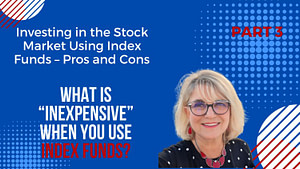
In this article I’ll talk about the COST of investing when you use Index Funds.
But first, a quick review…
In Part 1 of this articles’ series I talked about some good reasons to invest in the Stock Market using Index Funds.
In Part 2 I shared with you the 5 reasons for NOT investing with Index Funds.
Make sure you review the previous articles before diving into this one.
So, What Is “Inexpensive” When You Use Index Funds?
One of the main advantages of investing in the stock market using Index Funds is low cost of this type of investing, because Index Funds are not actively managed mutual funds…
They simply replicate the return on a specific market indexes.
This type of investing is considered passive.
Index Funds’ portfolio managers merely buy and hold a sample of the stocks in the target indexes, and then leave them alone… unless the index itself changes.
In other words, portfolio managers are not actively stock-picking holdings in the Index Funds by buying and selling the securities inside the funds.
And so, because of the low hands-on management involved, index funds have below-average expense ratios (unlike actively managed mutual funds), and are referred to as a low-cost investing option.
So, let’s define “low cost” of investing by looking at financial metric like Expense ratio.
Expense Ratios
An expense ratio reveals the amount that an investment management companies charge investors for managing an investment portfolio, a mutual fund, or an exchange-traded fund (ETF).
The Expense ratio represents all of the management fees and operating costs of the fund and shows the percentage of expenses compared to the amount of annual average assets under management in the fund.
Expense ratios are listed on the prospectus of every fund and on many financial websites.
BTW, competition has led expense ratios to fall dramatically over the past several years.
What are the High and the Low Expense Ratios?
A number of factors determine whether an expense ratio is considered high or low.
A good expense ratio, from the investors’ viewpoint, is around 0.5% to 0.75% for an actively managed portfolio.
An expense ratio greater than 1.5% is considered high.
In other words, the average expense ratio for actively managed mutual funds is between 0.5% and 1.0%, occasionally up to 2.5%.
For passive index funds, the typical ratio is about 0.2%.
Besides Index Funds, you can choose to invest in the Stock Market using ETFs (exchange-traded funds), which are NOT mutual funds.
ETFs are also passively managed funds and trade throughout the day, similar to stocks, while index funds trade once, at the market close.
In general, the expense ratios for mutual funds, including Index funds, are higher than expense ratios for ETFs
In other words, ETFs are often cheaper than index funds (if bought commission-free.)
Also, Index Funds sometimes have higher minimum investment amounts than ETFs.
However, some fund providers in the U.S., like Fidelity Investments and Vanguard Group, offer minimum investments on their Index mutual funds.
Understanding the Hidden Differences Between Index Funds
It might be reasonable to assume that the index funds that track the same indexes should all have the same performance.
However, there are many disparities across index funds, primarily because of the different operating expenses, and therefore, different Expense ratios.
Expenses are very important to consider when you invest because they can erode your return on investment.
Fees
Index funds with nearly identical portfolio components and investing strategies, can have different Fee structures.
Some index funds charge front-end loads, which are commissions or sales charges applied upfront when the initial purchase of an investment happens.
Other funds charge back-end loads, which are charges and commissions that occur when the investment is sold.
Other fees include 12b-1 fees, which are annual distribution or marketing fees for the fund.
The fees and expense ratio, when taken cumulatively, can dramatically impact an investor’s return over time.
So, various fees, along with the expense ratio, should be considered before buying an index fund.
Typically, larger, more established funds tend to charge lower fees.
For example, the Vanguard 500 Index Admiral Shares fund, which tracks the stocks of 500 of the largest U.S. companies, charges only 0.04% expense ratio!
The lower fees could be the result of:
- management experience in tracking indexes,
- a larger asset base, which could enhance the ability to use economies of scale in purchasing the securities (Economies of scale are cost savings and advantages gained by large companies when they buy in bulk, therefore, lowering the per-unit cost.)
The Bottom Line
A reasonable expense ratio paid to funds’ managers for an actively managed portfolio is about 0.5% to 0.75%, while an expense ratio greater than 1.5% is considered high these days.
For index funds, the typical ratio is about 0.2% but can be as low as 0.04% or less in some cases.
Like with most things, you often get what you pay for.
However, in the world of investing, there is evidence that low-cost passive index funds often outperform actively managed portfolios, especially after accounting for fees, expenses and taxes.
If you have any questions about this topic, go ahead and post them in the comments.
Next week I’ll share the Part 4, where I’ll discuss 4 Potential Warnings About Index Funds.
Stay blessed, stay in your power.
To your Health, Wealth, and Freedom.

